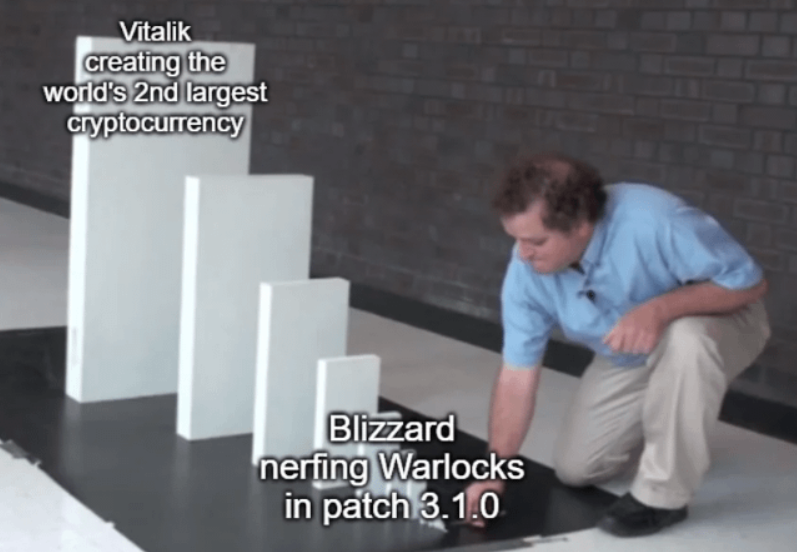A few months ago, this meme caught my attention:

patch 3.1.0 was an update to World of Warcraft, Warlock the character Vitalik was playing, nerfing means that the update made a particular kind of item or character much less powerful, and Blizzard is the game creator and operator of World of Warcraft (“the house” in casino parlance).
I was not surprised to hear of this being a motivation for Vitalik to explore the posibilities of Bitcoin, using blockchain to create an alternative to the mainstream way of developing and operating games. Making fair games has a very complex idea maze , particularly because “fair” is really hard to get right; and there are no good examples of online games without a company or organization setting all the rules, holding the power to change them a piaccere.
Games, Power, and Roles
While some games are purely for fun and entertainment, others have a more serious tone, often involving complex strategies and intricate rules. Only to understand the rules, participants already need to make an investment of time and energy, and in some cases, also money or other resources. No game is without real life (AFK) costs.
Games provide a window into our cultural assumptions, how our minds and creativity work, and how we relate with each other. Playing is an essential part of learning and growing up. Similar to reading biographies, playing allows you to import lessons from a life you didn’t live.
Within the various roles that players can assume in a game, some actors may hold more power than others. In this context, power is the ability to influence the dynamics of the game and change its outcome to one’s will. Things like skill, opportunities, and knowledge are general factors that make up that power.
But there is another kind of power: the power to set and change the rules of the game. The casino’s house, the server administrator, the facilitator, or the game master, are not often considered a normal player, but it’s a key role. Similar to a good government, a good host is invisible to the players1.
Changes in Game Rules
When game developers decide to alter rules, it can dramatically shift the balance of power among players. These changes may be perceived as unfair by some participants who have invested time and resources into learning the original ruleset. However, when the rule-setters are transparent about their reasons for making these adjustments, players might be more accepting of the new rules. Rule changes are part of the social contract with the game developer.
But every player in a game has an exit cost associated with leaving. This includes all those nights spent leveling up characters or acquiring virtual assets. And when your build gets nerf’d, the exit costs (mostly emotional) might cause you to feel imprisoned, trapped in an unfair virtual world. But most of the times, the operator is trying to balance the game, acting as an impartial judge, trying to foster a healthy and fun meta.
When the rules get changed, the meta game is exposed, a game where regular players have almost no power.
Transparency and Longevity
One of the major challenges facing online gaming is detecting and preventing cheating. Both players and “the house” struggle with identifying unfair tactics that give certain participants an advantage over others. For the administrator, catching cheaters is complicated because the best exploits are never noticed. For users, lack of transparency of what is the code the server is running means that there might be many rules changing, adjustments being made, or other players getting unfair advantages from administrators.
Blockchains have the potential to increase transparency within online gaming environments by providing an immutable ledger of all transactions occurring within a game. Although blockchain-based games still allow for rule changes, players can trust that any alterations will be transparent since they are recorded on the public ledger. This helps prevent situations where “the house” manipulates rules behind closed doors.
Adding to the uneven balance of power and the real consequences of changes, many online games have closed down their servers without warning, leaving players with nothing to show for their time and investment. Examples include Metaplace, City of Heroes, and Tabula Rasa – all of which ceased operations due to financial reasons or shifts in developer priorities. That’s another opportunity for blockchain gaming: “an NFT lasts forever”. Keeping the items and leveling information of a player is something that might allow the game to go on, even after the company that created the game is gone.
Making the source code open and releasing the server’s database is not enough: What if two independent new companies decide to run the server? The world gets forked away, in a very similar way to what happens when a blockchain forks.
Parting Thoughts
Rules and rule changes are not just properties of games, but they also apply to all kinds of real-life informational structures , such as markets and legal systems. Studying the dynamics of games can lead to valuable insights into how these principles might be applied more broadly in society. Games provide an opportunity to learn about complex adaptive systems, game theoretical scenarios, and information systems.
Winning in a game is leaving it a little wiser than when you started.
Here’s to a future with better experiences for players, and to a more level playing field for all participants.
-
Chapter 57, Tao Te Ching “Take no action, and people are reformed” ↩︎